I know how to list all collections in a particular database, but how do I list all available databases in MongoDB shell?
8 Answers
Listing all the databases in mongoDB console is using the command show dbs.
For more information on mongo shell commands, refer the Mongo Shell Quick Reference.
- 1,084
- 10
- 20
- 4,940
- 1
- 20
- 21
-
36And for anyone (like me) that has just installed mongodb and are confused that running `db` shows the current database is `test` but this is not listed via any of the comnmands on this page that is explained here http://stackoverflow.com/q/38726310/73226 – Martin Smith Aug 07 '16 at 16:39
-
3How on earth do you get to the shall though :/ – Jamie Hutber Aug 13 '17 at 23:52
-
3@JamieHutber you get so shell by typing `mongo` on the command line (of `mongo --nodb` to not connect to a database) – magikMaker Jan 26 '18 at 13:18
-
1Yeah I had to come here for something as simple as `show dbs` because I when I went to the docs I simply could not find the `show dbs` command anywhere. The 'docs' can be pretty frustrating at times. – MadHatter Jul 14 '18 at 16:17
-
2That command does not work in a `--eval`, just on an interactive shell. This answer's options does work (output format is different though) https://stackoverflow.com/a/32192253/1837991 – Gert van den Berg Nov 11 '19 at 08:11
-
I get this when I run in MongoDB Pod terminal in Red Hat OpenShift: `"errmsg" : "not authorized on admin to execute command { listDatabases: 1.0, $db: \"admin\" }"` – user1063287 Jan 16 '23 at 09:33
For database list:
show databases
show dbs
For table/collection list:
show collections
show tables
db.getCollectionNames()
- 27,862
- 20
- 113
- 121
- 2,917
- 19
- 27
For MongoDB shell version 3.0.5 insert the following command in the shell:
db.adminCommand('listDatabases')
or alternatively:
db.getMongo().getDBNames()
- 305,182
- 66
- 621
- 471
- 781
- 7
- 5
-
5if you are in your shell and only want names: `mongo admin --quiet -u
-p [ – Boop Jun 06 '19 at 12:55] --eval 'db.getMongo().getDBNames().forEach(function(db){print(db)})'` hth
From the command line issue
mongo --quiet --eval "printjson(db.adminCommand('listDatabases'))"
which gives output
{
"databases" : [
{
"name" : "admin",
"sizeOnDisk" : 978944,
"empty" : false
},
{
"name" : "local",
"sizeOnDisk" : 77824,
"empty" : false
},
{
"name" : "meteor",
"sizeOnDisk" : 778240,
"empty" : false
}
],
"totalSize" : 1835008,
"ok" : 1
}
to obtain a vertical list of all databases for downstream processing do this
mongo --quiet --eval "printjson(db.adminCommand('listDatabases'))" | jq '.databases[].name' | tr -d '"'
which gives below output listing all databases
admin
local
meteor
- 26,870
- 12
- 93
- 104
-
2Best solution here for running something automated (without going into mongo shell mode first) – herm Feb 21 '19 at 14:16
-
Based on this answer I came up with `listDatabases="$(mongo --quiet --eval "printjson(db.adminCommand('listDatabases'))")"; ( while IFS=$'\t' read -r size name; do printf '%s\t%s\n' "$name" "$(numfmt --to=iec <<<"$size")"; done < <(jq -r '.databases[] | [.sizeOnDisk, .name] | @tsv' <<<"$listDatabases" | sort -rn); printf -- '-\t-\n'; printf "TOTAL\t%s\n" "$(jq -r .totalSize <<<"$listDatabases" | numfmt --to=iec)" ) | column -t -s$'\t'` to list all databases, sorted by size and the total at the end. – Paul Tobias Aug 30 '22 at 02:55
To list mongodb database on shell
show databases //Print a list of all available databases.
show dbs // Print a list of all databases on the server.
Few more basic commands
use <db> // Switch current database to <db>. The mongo shell variable db is set to the current database.
show collections //Print a list of all collections for current database.
show users //Print a list of users for current database.
show roles //Print a list of all roles, both user-defined and built-in, for the current database.
- 14,264
- 6
- 62
- 62
Couple of commands are there to list all dbs in MongoDB shell.
first , launch Mongodb shell using 'mongo' command.
mongo
Then use any of the below commands to list all the DBs.
- show dbs
- show databases
- db.adminCommand( { listDatabases: 1 , nameOnly : true} )
For more details please check here
Thank you.
- 230
- 3
- 9
According to MongoDB official document, for MongoDB 4+, you can list database name only by running db.adminCommand( { listDatabases: 1, , nameOnly: true } ) against the admin database.
If you are using MongoDB Cloud, you need to connect to your MongoDB deployment first. In that case, you can run this command mongosh "mongodb+srv://cluster0.<your-connection-string>.mongodb.net" --apiVersion 1 --username <your-user-name> in your terminal.
Atlas atlas-xxxxxx-shard-0 [primary] test> db.adminCommand({listDatabases:1 , nameOnly: true})
{
databases: [
{ name: 'sample_airbnb' },
{ name: 'sample_analytics' },
{ name: 'sample_geospatial' },
{ name: 'sample_guides' },
{ name: 'sample_mflix' },
{ name: 'sample_restaurants' },
{ name: 'sample_supplies' },
{ name: 'sample_training' },
{ name: 'sample_weatherdata' },
{ name: 'admin' },
{ name: 'local' }
],
ok: 1,
'$clusterTime': {
clusterTime: Timestamp({ t: xxxxxxxxxx, i: 1 }),
signature: {
hash: Binary(Buffer.from("xxxxxxxxxxxxxxxxxxxxxxxxxxxxxxxxxxxxxx", "hex"), 0),
keyId: Long("xxxxxxxxxxxxx")
}
},
operationTime: Timestamp({ t: xxxxxxxxxx, i: 1 })
}- 432
- 1
- 3
- 8
I have found one solution, where admin()/others didn't worked.
const { promisify } = require('util');
const exec = promisify(require('child_process').exec)
async function test() {
var res = await exec('mongo --eval "db.adminCommand( { listDatabases: 1 }
)" --quiet')
return { res }
}
test()
.then(resp => {
console.log('All dbs', JSON.parse(resp.res.stdout).databases)
})
test()
- 3,365
- 26
- 26
